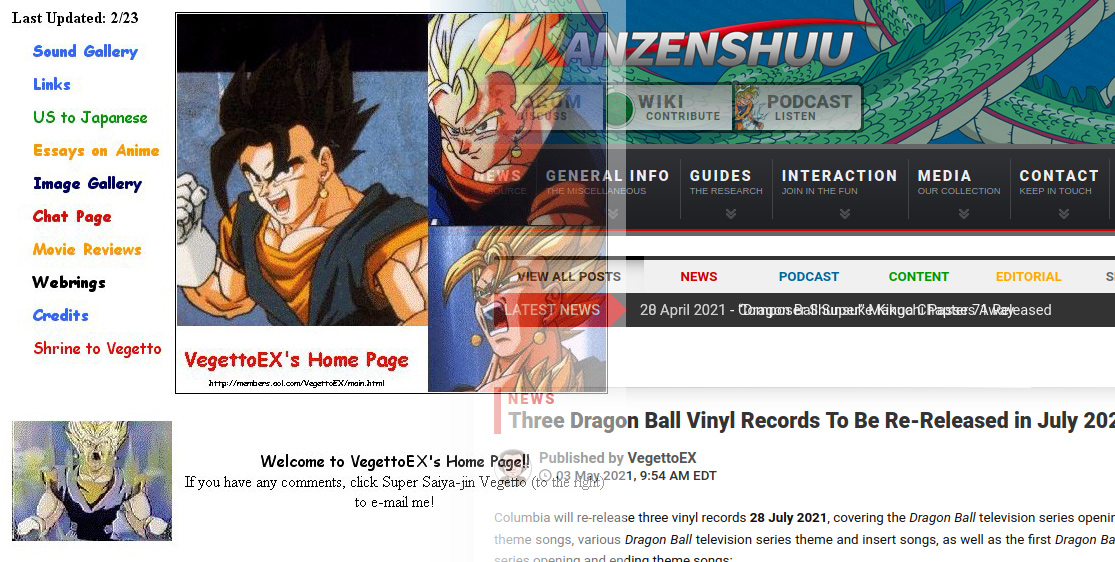I’ve always been a pretty casual “fan” of Giant Bomb: primarily a Bombcast (and later Beastcast) listener, and rarely a viewer of any video content. That… probably sounds bizarre considering what their primary output is, but I guess I’ve just always been a text-and-audio person, even when it comes to commentary on a visual medium. Strange, but if you follow me and the things I do online, that probably makes sense, right?
Trying to put my finger on when I first began following Giant Bomb is difficult. I don’t go back and re-listen to podcast episodes, so trying to think back, my earliest memories are probably of the recurring bits planning “raids” on Japan’s used game market. Ryan Davis’ passing was difficult to hear, and if that was 2013, that means I had already been following them for a while.
We launched the merged Kanzenshuu in 2012, so a lot of my Bombcast listenings are wrapped up in Kanzenshuu pre-production work memories. I think that’s why listening to Vinny, Brad, and Alex announce their respective departures this week, talk about what they built, being proud of it, hearing stories of the early basement days, and thinking about the future – both their own individual futures as well as that of the site – is really giving me some pause.
One thing I struggle with is trying to explain how happy I am that we never made Kanzenshuu “more” than it is, because that’s not the right way to explain it. With something like a website, you would probably assign a default meaning of “more” as being “turned it into a business.” We didn’t pivot to video. We didn’t selectively target other services. We didn’t ever put ads on the main website content.
Kanzenshuu isn’t a business, and despite some of the things we may want and need to do in the future, it’s never going to be a real business. That’s explicitly built into our mission and goal for the site. And because it’s not a business, there’s no chance of it ever being bought-out, sold, or managed in a way that isn’t of our own vision. For us, working “real jobs” while keeping Kanzenshuu as a hobby is what we all agree allows us to keep the same passion we’ve had since the 90s, and continuously reinvest that passion right back into it. We may not be regular, but we also never stop.
I’m exceptionally proud of us being able to stick it out as an old-school DIY “fansite” in an era where no-one even knows what websites are anymore. We believe that raw information and documentation (text will forever be the best format for this) is separate from commentary and personality: the former should be free and widely accessible and a labor of love by people working toward an unachievable yet worthwhile ideal, while the latter… eh, you do you, and hustle how you need to.
Our website is weirdly both of those, though: particularly with the launch of the podcast back in 2005, and looking ahead to the wiki in 20XX, we’re solidly split between documentation and commentary.
What that ultimately means is that Kanzenshuu – and its former incarnations – will forever be entwined with me, no-one can take it away from me (or my fellow co-founders), and I don’t think it’s possible for me to ever walk away from it. Even if there are breaks, we are Kanzenshuu forever.
So as I listen to personalities from a business I’ve followed say their goodbyes and pontificate about the future of the brand, I start worrying and wondering for myself about that same thing for my baby. I have a pretty good vision of where I want to take Kanzenshuu, and one thing I’m thankful for is that my comrades share not just that vision, but the timeline for it. We’re not going to have stuff done tomorrow, or next month, or maybe even next year. We’re old, and shit’s hard. But it’s always a work in progress, it’s always going to get better, and it’s always going to be there.
(I want to make explicitly clear that this is all what works for us. A documentation source with the full support of a backing corporate entity is [probably] totally doable, and I don’t inherently have anything against it at all. Same goes for legitimate anime/manga releases. There’s good, valid, even archival-quality stuff out there [see: Discotek]. That’s just not what we want to do.)
That ultimately means we’re never going to be the biggest, the most contemporary, or most recognizable, though.* I’ve been OK with and made peace with that since I let Planet Namek eat my lunch by launching a website with a real domain name in late 1998.
One thing I can guarantee is that in the end, after everything else, no matter what happens with whatever other online services may come and go, I’ll be there to help you figure out what Toriyama said on page 214 of Daizenshuu 6, when that preliminary release of V-Jump actually hit book store shelves in Japan, or where that image of Goku actually first originated.
And I’m going to still love doing it with friends and family by my side. You will keep referencing the Intended Endings Guide, translations archive, and rumor guide – and next up the wiki! – over the next several decades whether you like it or not!
(* One thing I love† doing is searching misspellings of Kanzenshuu and seeing people conflate us with official publications and hurl racial epithets at each other as they argue the nature of canonicity, with us indeed ultimately being the underlying source of whatever information they may or may not even remotely have a grasp on, generally two languages removed from their native one.)
(† “love” may not be the right word here)

Leave a Reply